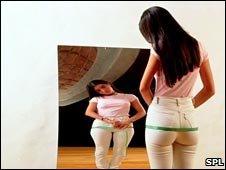Brain 'distorts own body image'
- Published

People with anorexia have a distorted body image
The brain naturally distorts body image - a finding which could explain eating disorders like anorexia, say experts.
Scientists at University College London discovered people tend to think that their hands are wider and their fingers are shorter than they truly are.
They say the confusion may lie in the way the brain receives information from different parts of the body.
Distorted perception may dominate in some people, leading to body image problems, a US journal reports.
Lead researcher Dr Matthew Longo said: "These findings may well be relevant to psychiatric conditions involving body image such as anorexia nervosa, as there may be a general bias towards perceiving the body to be wider than it is.
"Our results show dramatic distortions of hand shape, which were highly consistent across participants."
In the study in Proceedings of the National Academy of Sciences, Dr Longo's team asked 18 volunteers to take part in an experiment.
The volunteers were asked to put their left hands palm down under a board and judge the location of the covered hand's knuckles and fingertips with a pointer.
This revealed striking distortions - the volunteers tended to misjudge their hands as wider and their fingers as shorter than they actually were.
The researchers say the distortions are subconscious and involve the ability known as position sense that the brain uses to know where all parts of the body are in space even when the eyes are closed.
'Biological explanation'
Dr Longo said: "Of course we know what our hand really looks like, and our participants were very accurate picking out a photo of their own hand from a set of photos with various distortions of hand shape.
"So there is clearly a conscious visual image of the body as well. But that visual image seems not to be used for position sense."
Susan Ringwood, chief executive of the eating disorders charity Beat, said: "We know that one of the features of anorexia nervosa can be distorted body image.
"People affected can truly believe that they are grossly fat, even when they are dangerously underweight.
"They are able to judge other people's bodies quite accurately and would describe someone else the same size as themselves correctly, but still not be able to do that about their own weight and shape.
"This brain study may give some insight into how this could be possible, and could be very motivating for people with eating disorders to know that there was a biological explanation for their experiences, rather than feeling it was their fault."